Mankind doesn’t stand still. Every day, we make more and more discoveries and invent new technologies that improve our lives. OpenAI’s ChatGPT is no exception to this. This incredible innovation has already stirred up everyone in the world, including those working in the education sector. Some of them are worried that the invention of ChatGPT will negatively affect the learning process, ensuring that students will stop trying in their studies. However, our experts are confident that this AI language model will only benefit them.

Are you wondering why? Well, let us share the reasons in the article on this page! Here, we have examined the benefits of ChatGPT and how students can use it ethically. We have also examined how well the language model deals with generating different types of essays. Finally, we will offer some tips for constructing the most efficient prompts in ChatGPT. We hope that with the help of this article, you will come to realize the effectiveness and usefulness of this advanced AI program.
💬 Introduction to Chat GPT
ChatGPT is the result of humanity’s technological progress. In a nutshell, it is a program that uses algorithms that simulate artificial intelligence, which makes working with it as close as possible to human communication. The chatbot was introduced by OpenAI, a company that created it to improve the productivity and efficiency of businesses. OpenAI plans to flood chatbots’ main application areas, such as training platforms, commerce, tech support, etc.

ChatGPT has left no one indifferent and has already captivated many users with its array of applications. It can generate and customize responses to unique requests. Its novelty lies in its ability to write a coherent article, a summary, or code in seconds. It can even give a person a preliminary diagnosis based on the symptoms they provided! Moreover, ChatGPT answers questions in an almost natural conversational manner, leaving no room for traditional, already outdated chats. This was achieved thanks to the language models of probabilities and sequences used in its text recognition.
If we’ve intrigued you with the novelty that is ChatGPT, be sure to read our full review article here!
☯️ The Ethics of Chat GPT
You’ve probably heard about the moral panic among schools and colleges caused by ChatGPT. Initial studies show that of the thousands of students surveyed, around 89% had already used the program to speed up the homework process. Looking at these statistics, it’s easy to see why teachers and students alike have begun to worry about the implications of using AI in schoolwork.
Here, we’ll take a closer look at the ethical and moral considerations of ChatGPT and offer a few better ideas about what students can use it for.
Bad Idea: Using ChatGPT to Cheat
Indeed, the idea of using ChatGPT to write papers and turning them in as your own is a bad one for many reasons. Let’s take a closer look at them:
Better Idea: Using ChatGPT to Improve Your Writing
We want to take a moment to describe how ChatGPT can improve your writing skills. In fact – who can better describe ChatGPT’s functionality than ChatGPT itself? So, let us allow the AI itself tell you how it can strengthen your writing:
“ChatGPT can improve students’ writing skills in several ways:
- Providing writing prompts and suggestions for ideas to help students practice and improve their writing skills.
- Offering instant feedback on grammar, spelling, and syntax, which can help students improve their writing accuracy.
- Offering suggestions for alternative words and phrases to improve writing style and vocabulary.
- Encouraging students to read and analyze text written by others, which can help them understand good writing practices.
- Assisting students in editing and revising their writing, which can help them develop critical thinking skills and improve the quality of their writing.
- Providing explanations and examples of various writing techniques, such as persuasive writing, descriptive writing, and narrative writing, which can help students understand the different aspects of writing.”
Source: OpenAI’s ChatGPT
📄 ChatGPT and Different Essay Types
As you’ve read above, ChatGPT has many features that can be useful to a student. In this part of the article, we’ll focus on the last of them – providing explanations and examples of various writing techniques. We’ll tell you about the different kinds of essays you might encounter in an academic setting and evaluate how well the chat can work with them. Also, we will explain how to approach ChatGPT with the right request and describe what you’ll need to keep in mind when working with it. Finally, beneath each essay type, you’ll see an example of a prompt and the work generated by it.
📋 Informative Essay
As the name suggests, the main purpose of an informative essay is to inform the reader on a specific topic. It can be a historical event, innovations in the techno sphere, research results, etc. The essay should not contain the author’s subjective evaluation, reflections, and analysis. We can find a typical example on Wikipedia pages, where we only get straight facts and information about a certain topic.
The four types of informative essays are:
- Definition – The definition essay aims to provide simple information or an explanation of a topic.
- Compare and contrast – Compare and contrast essays should include two or more phenomena to characterize and compare in the same application area.
- Analysis – An analysis essay demonstrates cause-and-effect relationships or interrelationships of the phenomena in question.
- Instructional – The instructional essay serves as a guide, describing the process of doing things to achieve a particular result.
Tips for ChatGPT Prompts: Informative Essay
An informative essay is perhaps most suitable for generating with ChatGPT. Since it’s based on objective information, the language model has no problems creating a high-quality paper. The main thing to remember is to formulate your demands as accurately as possible. They should be detailed but not too long to avoid the program being misled by the words. Also, don’t forget to double-check the information provided by the chat, as it may be incorrect or outdated. That is especially true for references – even if they look authentic, you’ll have to verify them yourself.
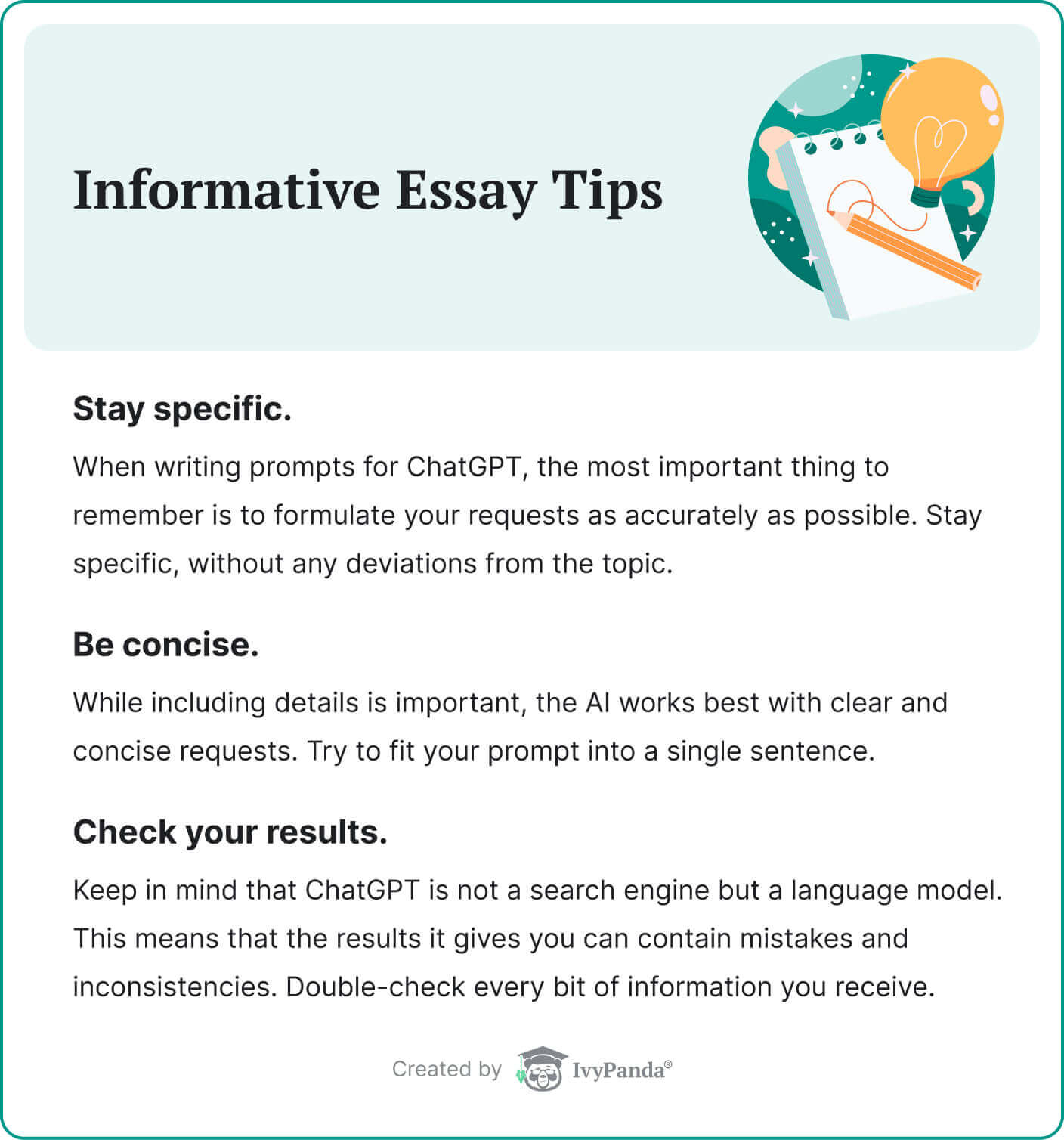
AI-Generated Informative Essay Example
🗣️ Persuasive Essay
A persuasive essay is a type of writing that presents contesting opinions, and our task is to prove the truth or relevance of one thought over the other. As a result of reading the essay, the reader should accept our point of view.
To do this, we use the following:
- Sound evidence.
- Facts.
- Examples.
- Justifications.
- Quotes from influential people in the field.
Therefore, we can’t base the text solely on the opinion itself but have to back it up as well. Your argument can be emotionally colored or purely logical, depending on your choice. A persuasive essay differs from a comparative essay as it elaborates on only one side – the one you’re promoting.
Tips for ChatGPT Prompts: Persuasive Essay
ChatGPT is fairly adequate at constructing persuasive essays. Its advanced language model can build any argument when the query is constructed correctly. Let us propose an example: you want to ask for an essay on whether students should be allowed to use phones at school. In this case, you must remember to clarify what position ChatGPT should take – for or against. You can also ask the program to build more emotional arguments or, conversely, to rely more on logic. This can be done in the original construction of the prompt. Alternatively, it can be requested in a supplementary message by asking the program to correct the text after receiving the first version.
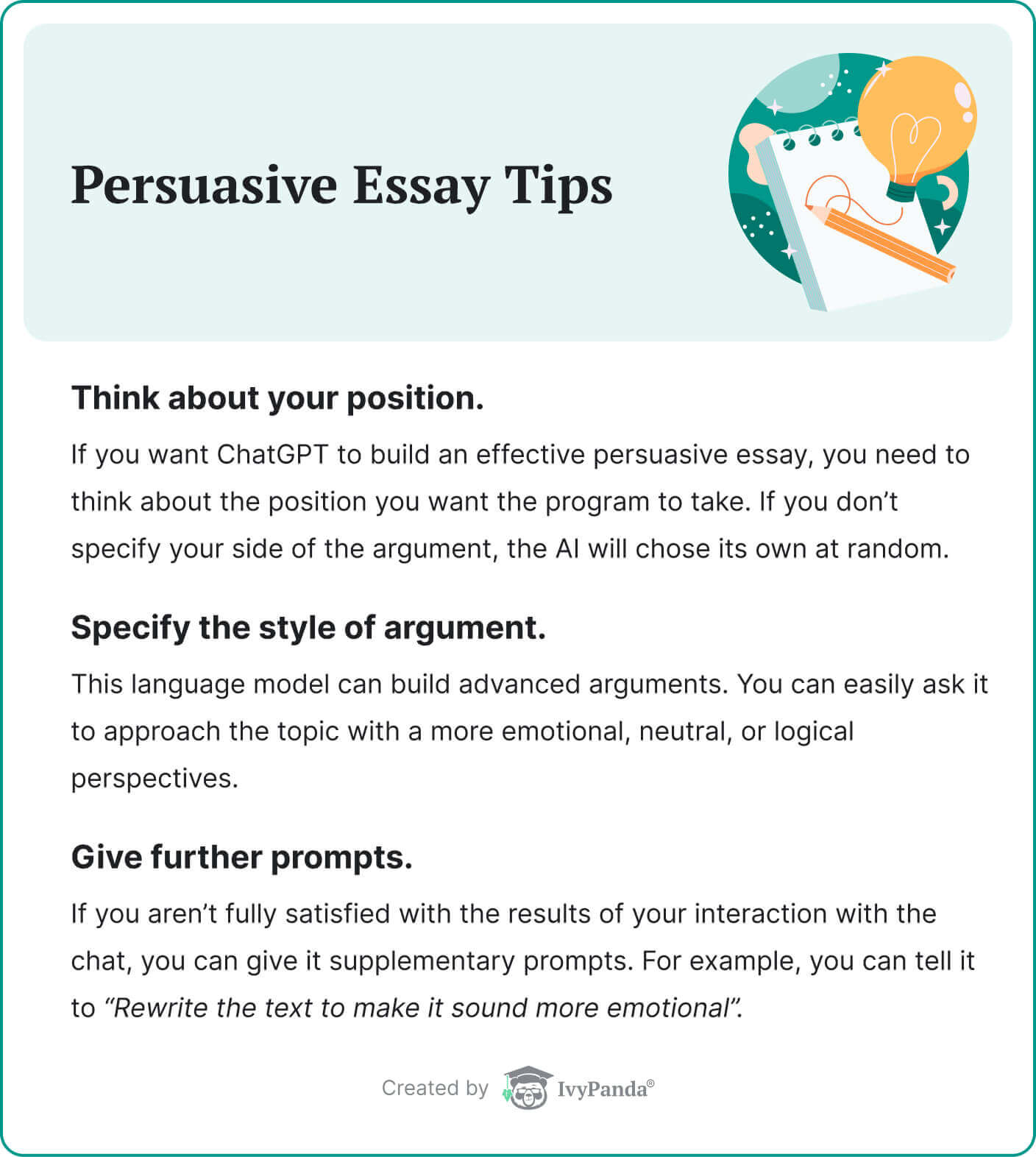
AI-Generated Persuasive Essay Example
📚 Narrative Essay
A narrative essay is typically a text where you, as the author, share stories from your life. The key purpose is to share your experiences and build a certain picture of your personality for the reader.
You can talk about:
- Past events.
- Future plans.
- Hypothetical scenarios.
- Your values or qualities.
- The character of someone close to you.
- Your current life situation.
However, these stories can also be purely fictional. One of the key points of the narrative essay is the ability to hook the audience. Your story should be captivating and intricately designed with interesting word choices and sentence structures. For example, you can use elements of comedy, irony, or tragedy to touch upon the reader’s heartstrings.
Tips for ChatGPT Prompts: Narrative Essay
Although narrative essays frequently describe personal experiences, you can still use ChatGPT for inspiration. If you are assigned to write a narrative essay on an open-ended topic, you can ask the chatbot to generate some ideas for you. Additionally, you can also ask the program to generate text in a particular style or ask it to paraphrase your original writing to see how it can be improved. Keep in mind that while this AI can provide a bunch of different plots, they will still have fairly monotonous wording. You will need to perfect anything generated by ChatGPT on your own.
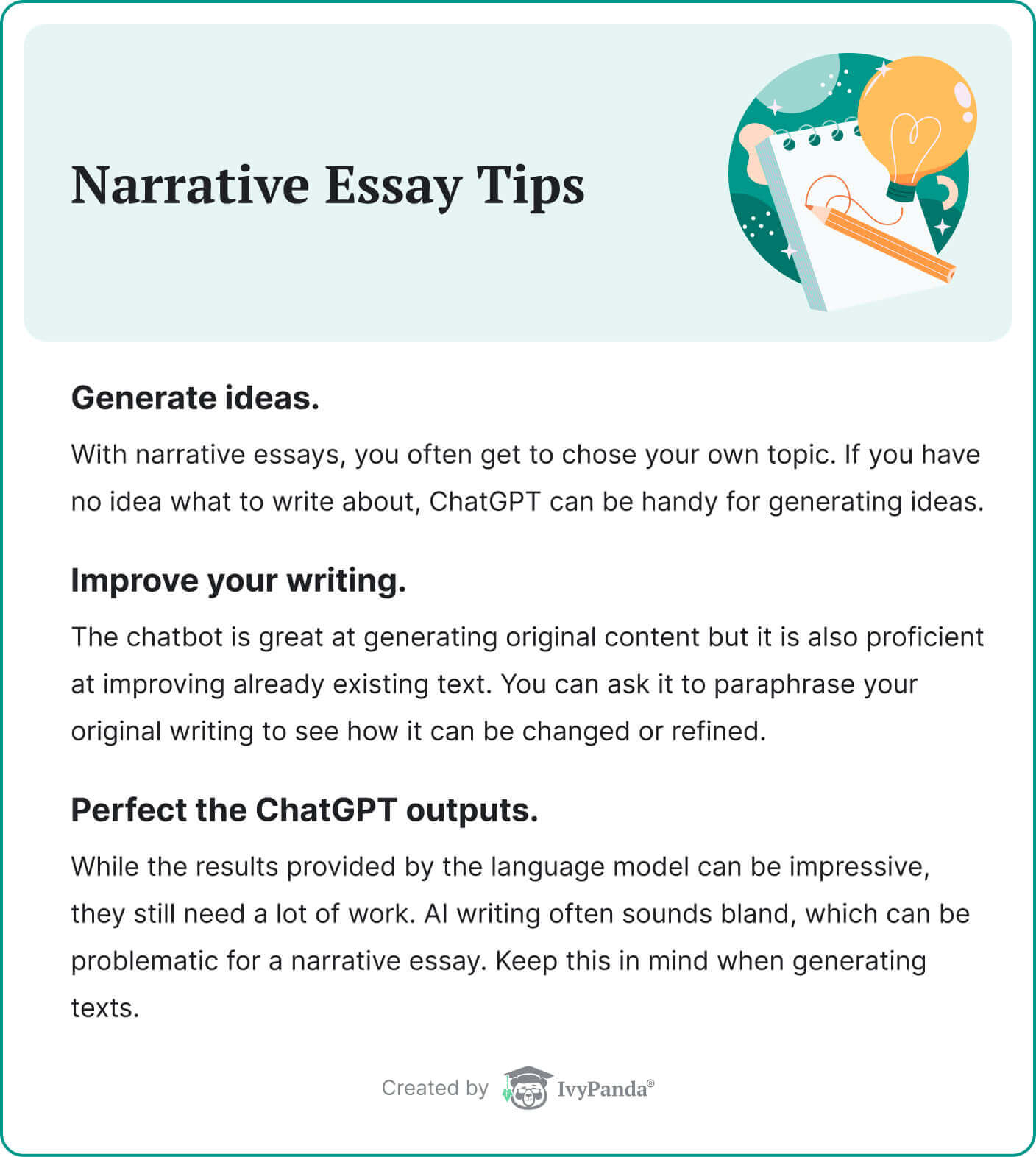
AI-Generated Narrative Essay Example
🗳️ Opinion Essay
The purpose of an opinion essay is to express a judgment on a particular topic. The writer’s point of view should be clear, contextual, and coherent. Each argument given should be supported by facts and examples. This essay requires logical connections, reflection, fundamental analysis, and persuasiveness. So how is an opinion essay different from a persuasive essay? Mainly in the fact that you don’t need to compare and contrast differing viewpoints – you’re simply promoting your own.
Tips for ChatGPT Prompts: Opinion Essay
Among all of the mentioned types of essays, the opinion essay is probably the most difficult for ChatGPT. Since AI technology doesn’t have its personal opinion, it can only generate text based on information gathered from the web. When creating your request, it’s essential to clarify what kind of opinion you want to hear. Also, it’s worth remembering that opinion essays should be strongly supported by facts and evidence, which the chatbot has a problem with. Besides, this program suffers from the uniform wording of different content, so opinion essays on different topics will sound very similar. ChatGPT is improving every day – however, at the moment, its opinion essay construction leaves a lot to be desired.
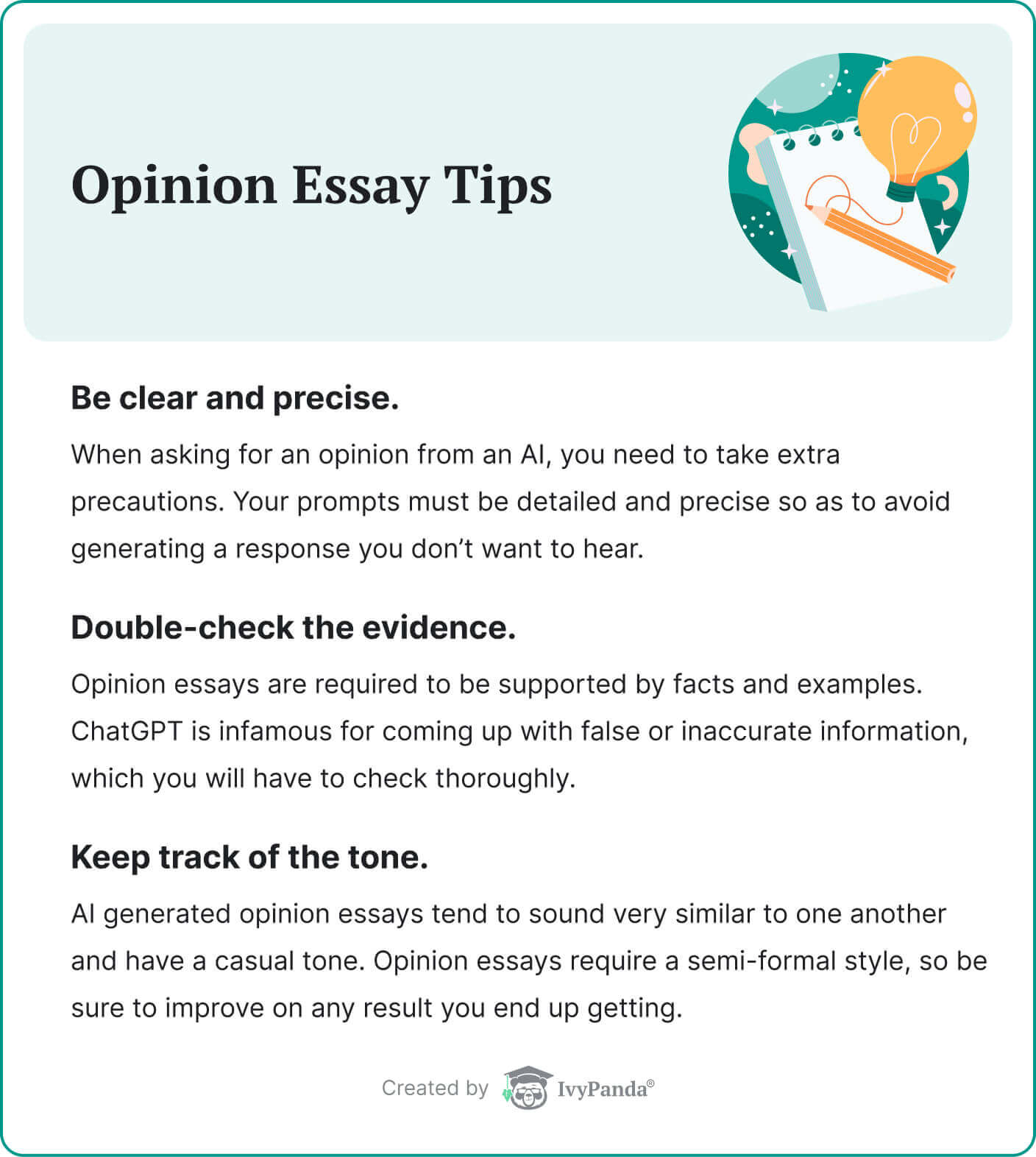
AI-Generated Opinion Essay Example
🖊️ How to Write Successful ChatGPT Prompts
Although it’s pretty easy to work with ChatGPT, it understands some requests much better than others. When you know how to phrase your ideas correctly, you get more out of the program. This is why we’d like to recommend some tips on how to formulate your requests to get the best results.
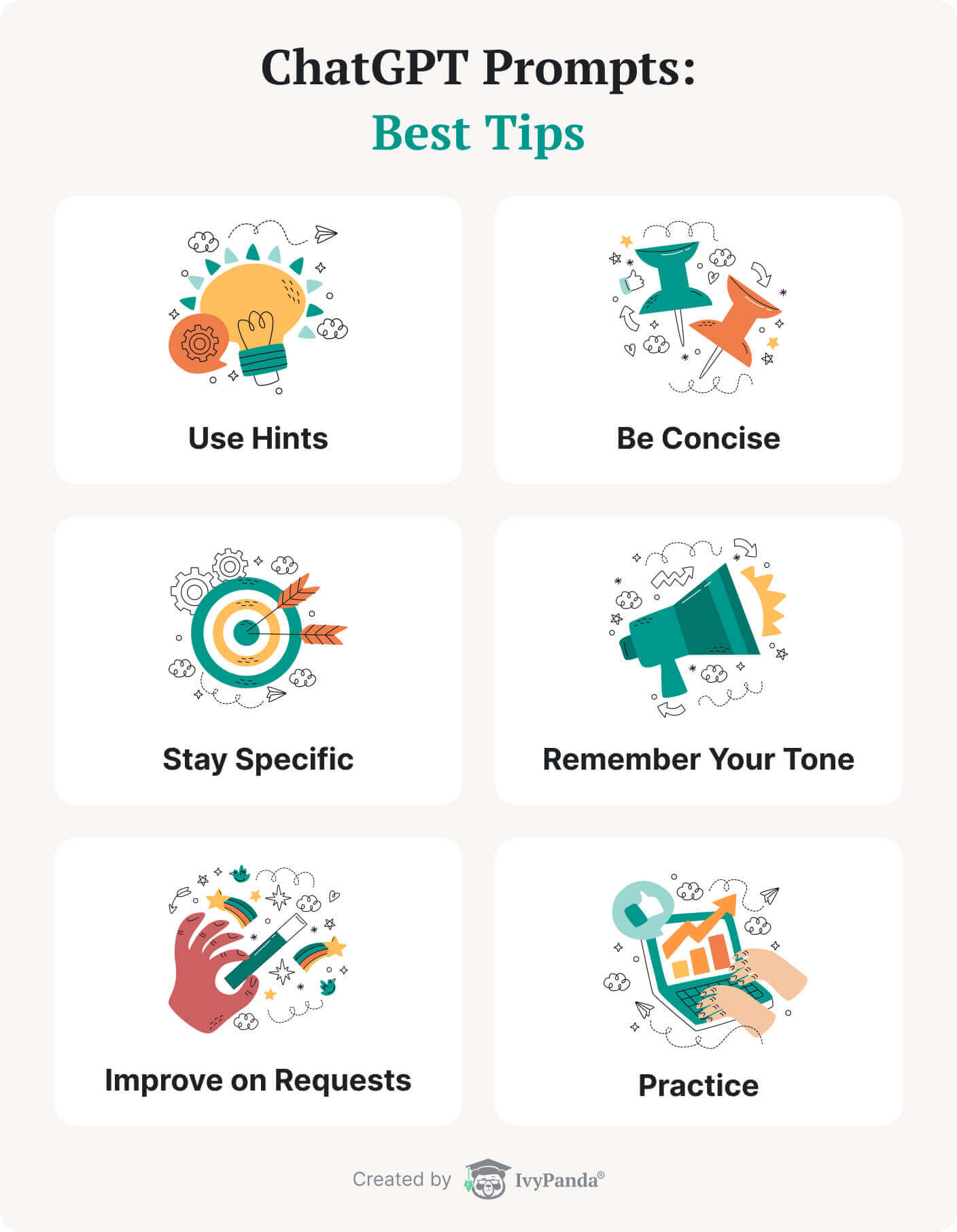
- Use Hints.
For accurate results, we recommend giving hints to ChatGPT, such as background information and context. It helps to optimize the AI search and to focus on certain keywords you have specified when inputting your data. As a result, you reduce the likelihood of including meaningless material in your research. - Be Concise in Your Wording.
Make sure that your sentences are specific, concise, and understandable. It’s challenging for the tool to analyze long strings of words with lots of different terms and information. It’s better to give instructions in short sentences. For example, the sentence: “I want to learn more about this topic, how it developed, how specialists came to these latest discoveries in technology.” will be much less effective than: “Tell me about the latest innovations in IT.” - Stay Specific.
ChatGPT cannot answer overly general questions, such as “What is our purpose?” Since it is an AI, it has a limited ability to answer such queries. Also, avoid asking questions that can be answered with a yes/no. Otherwise, you are unlikely to get a helpful and in-depth response. Make sure that the meaning of the request advises your topic and scope of research. - Remember the Tone of the Research.
Keep in mind that your requests will be better processed if they are written in a formal and academic fashion. Avoid using slang or jargon, as well as any confusing constructions. Otherwise, the chatbot may misinterpret the purpose of your query, and you will end up with confusing results. - Improve the Request.
Feel free to refine your prompts several times. Adding details to your queries will help you receive more thoughtful and specific answers. Since ChatGPT has an impressive memory, you can ask it to refine the same text several times in supplementary messages. Try to avoid repeating instructions, phrases, and duplicate thoughts. - Practice AI Queries.
The more often you practice with ChatGPT, the better your results will be. With enough time, you will grow to learn which phrases and commands are more understandable to the AI.
Were we able to interest you in ChatGPT? If your answer is yes, why not share this article with your friends? Send them this link and use ChatGPT together!
📎 References
- What is ChatGPT And How Can You Use It? – Roger Montti, Search Engine Journal
- What is ChatGPT? What to Know About the AI Chatbot – Karen Hao, The Wall Street Journal
- How enterprises can use ChatGPT and GPT-3 – Lucas Mearian, Computer World
- ChatGPT For Students: How AI Chatbots Are Revolutionizing Education – Jake Mallow, eLearning Industry
- 19 Ways to Use ChatGPT in Your Classroom – Larry Ferlazzo, Education Week
- Chat GPT: what does this mean for you as a student? – Radbound Universiteit
- ChatGPT: How to write the perfect prompts – Sophia Schmid, Neuroflash
- 100 Best ChatGPT Prompts to Unleash AI’s Potential – Damir Yalalov, Metaverse Post

![187 Impressive Higher English Persuasive Essay Topics [2026]](https://ivypanda.com/blog/wp-content/uploads/2020/10/front-view-of-books-with-blue-background-309x208.jpg)
![227 Amazing College Persuasive Essay Topics & Speech Ideas [Free]](https://ivypanda.com/blog/wp-content/uploads/2020/10/teenager-student-girl-over-yellow-pointing-finger-to-the-side-309x208.jpg)
![193 Sports Persuasive Essay Topics [with Tips & Examples]](https://ivypanda.com/blog/wp-content/uploads/2020/10/sport-composition-with-modern-elements-309x208.jpg)